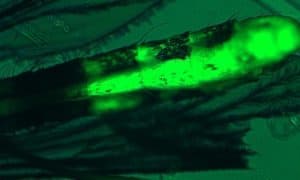
Fluorescent microplastics (bright green) are visible inside an adult mosquito. The particles can then spread to animals that eat the insects.
Credit: Al-Jaibachi et al/Biology Letters
Microplastic can escape from polluted waters via flying insects, new research has revealed, contaminating new environments and threatening birds and other creatures that eat the insects.
Scientists fed microplastics to mosquito larvae, which live in water, but found that the particles remained inside the animals as they transformed into flying adults. Other recent research found that half of the mayfly and caddisfly larvae in rivers in Wales contained microplastics.
Concern over microplastic pollution is rising rapidly as it is discovered in ever more places, and very little research has been done on how it may harm wildlife or humans. The particles can harbour bacteria or leach toxic chemicals. Microplastics have been found in tapwater around the world, in vast numbers in the oceans and sea creatures and even in remote Swiss mountains.











Another good reason to stop making and using plastic and go back to glass for all food needs, and use other things like cotton for packaging, until they find something wrong with cotton.